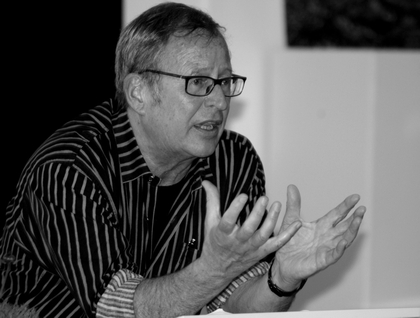Thomas E. Kennedy focuses on a question that has empowered him – and could also empower you – as a writer.

*From the W&A Archive: This article was originally posted in 2012*
When do you become a writer?
When you’re starting out and have published little, maybe nothing at all yet, it is hard to believe in yourself as a writer. Back when I’d only published two or three stories, although I had been at it for years, when someone asked me what I did, I felt funny claiming to be a writer.
Did I really have to identify myself with the day job that paid my bills even though I considered writing the most important thing I did?
I asked a former teacher, Gordon Weaver, whose resumé included a dozen books of fiction, at what point he felt comfortable saying he was a writer. His answer empowered me.
He said, “A writer is someone who writes. A serious writer is someone for whom writing is the most serious activity he or she knows. The amount of publication, money, fame you might get – these are extra-literary factors.”
With those words at my back, I began to call myself a writer.
Must you write?
This is a question that I learned to ask myself from the great Austrian poet R. M. Rilke from his marvellous Letters to a Young Poet (there is a photograph of Marilyn Monroe reading it by the way).
What Rilke said to the young poet he was mentoring was, ask yourself, ‘Must I write?’
If your answer is no, you have gained important self-knowledge; if you are able to quit writing, perhaps you should seriously consider doing so.
But if your answer is yes, then that matter is settled and you don’t have to waste time agonising over it. You cannot quit – writing is too important to you.
What is the greatest reward of writing?
Rewards for your writing sometimes seem scarce. How much are you paid for a story or a poem? How many copies are published of the magazine in which it appears? How many people actually read it? How often do you even earn a word of encouragement for what you’ve written?
Of course we do want to get our stuff out there; we want it to be read. But at some point every serious writer will recognize that of all the rewards you get or do not get as a writer, the single most important reward must be the act of writing itself. It is a gift and privilege to be able to write, and surely every serious writer has experienced this reward when she or he is working at top end – when you are in perfect harmony with the place your words come from, the place where your stories are waiting to be told.
At the risk of seeming mystical, in my experience that is a sacred place, and being allowed to enter it is the closest thing I know to a spiritual discipline. There is no reward – money, renown, publication – greater than the privilege of gaining entry to that place.
Must I listen when the muse sings?
“In his wonderful book On Writing, Henry Miller said that if you don’t listen when the Muse sings, you get excommunicated. He claimed that when they sang his racy tropics to him, he begged to be let off the hook; please, they’ll kill me! But – fortunately for us – he listened and he wrote.
“The fastest way to a writer’s block is to be super-critical of the words that are offered to you from the place – be it mind, soul, body – that words are offered up from.
“As a writer, in my experience, you have an impulse to write something, but you don’t know what you are going to write until you have written it. To berate and reject the words that are rising up in you, crying out to be told is to insult that within you which is most important to you as a writer – the place where the spirit becomes word and takes form.
“There is time enough afterwards to pinch and poke them into shape, to discipline and revise them – but first allow them to take form. Allow your stories or poems to tell themselves before you begin to go at them with the editorial knife.”
Thomas E. Kennedy is the author of eight novels, as well as several collections of short stories and essays. He teaches creative writing at Fairleigh Dickinson University.
Falling Sideways, published by Bloomsbury in 2011, is one of four novels comprising the Copenhagen Quartet. It is the first of Kennedy’s books to be published in the UK.
Click to visit the official website of Thomas E. Kennedy
Find out more about titles and buy the latest releases from Thomas E. Kennedy at Bloomsbury.com.
Comments